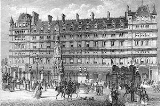
Parker v. South Eastern Railway Company
Encyclopedia
Parker v South Eastern Railway [1877] 2 CPD 416 is a famous English
contract law case on exclusion clause
s where the court held that an individual cannot escape a contractual term by failing to read the contract but that a party wanting to rely on an exclusion clause must take reasonable steps to bring it to the attention of the customer.
, run by the South Eastern Railway Company
. On depositing his bag and paying two pence he received a ticket. On the front it said "see back". On its back, it stated that the railway was excluded from liability for items worth £10 or more. Mr Parker failed to read the clause as he thought the ticket was only a receipt of payment. However, he admitted that he knew the ticket contained writing. Mr Parker's bag, which was worth more than £10, was lost. He sued the company. The question of law put to the court was whether the clause applied to Mr Parker. At trial the jury found for Mr Parker as it was reasonable for him not to read the ticket.
decided in favour of Mr Parker, upholding the jury award. Lindley J remarked,
Baggallay LJ concurred, and predicted that the same result would be reached by the jury (in Mr Parker's favour). Bramwell LJ
dissented, holding that reasonable notice should be a question of law, and that he would have decided in favour of the railway company.
England
England is a country that is part of the United Kingdom. It shares land borders with Scotland to the north and Wales to the west; the Irish Sea is to the north west, the Celtic Sea to the south west, with the North Sea to the east and the English Channel to the south separating it from continental...
contract law case on exclusion clause
Exclusion clause
An exclusion clause is a term in a contract that seeks to restrict the rights of the parties to the contract.Traditionally, the district courts have sought to limit the operation of exclusion clauses...
s where the court held that an individual cannot escape a contractual term by failing to read the contract but that a party wanting to rely on an exclusion clause must take reasonable steps to bring it to the attention of the customer.
Facts
Mr Parker left a bag in the cloakroom of Charing Cross railway stationCharing Cross railway station
Charing Cross railway station, also known as London Charing Cross, is a central London railway terminus in the City of Westminster, England. It is one of 18 stations managed by Network Rail, and trains serving it are operated by Southeastern...
, run by the South Eastern Railway Company
South Eastern Railway (UK)
The South Eastern Railway was a railway company in south-eastern England from 1836 until 1922. The company was formed to construct a route from London to Dover. Branch lines were later opened to Tunbridge Wells, Hastings, Canterbury and other places in Kent...
. On depositing his bag and paying two pence he received a ticket. On the front it said "see back". On its back, it stated that the railway was excluded from liability for items worth £10 or more. Mr Parker failed to read the clause as he thought the ticket was only a receipt of payment. However, he admitted that he knew the ticket contained writing. Mr Parker's bag, which was worth more than £10, was lost. He sued the company. The question of law put to the court was whether the clause applied to Mr Parker. At trial the jury found for Mr Parker as it was reasonable for him not to read the ticket.
Divisional Court
Lord Coleridge CJ, Brett J and Lindley JNathaniel Lindley, Baron Lindley
Sir Nathaniel Lindley, Baron Lindley SL PC FRS was an English judge.-Biography:He was the second son of the botanist John Lindley, born at Acton Green, London. He was educated at University College School, and studied for a time at University College, London...
decided in favour of Mr Parker, upholding the jury award. Lindley J remarked,
Court of Appeal
The majority of the Court of Appeal held there should be a retrial. They said that if Mr Parker knew of the conditions he would be bound. If he did not know, he would be bound if he was given the ticket in such a way as amounted to "reasonable notice". Mellish LJ said the following.Baggallay LJ concurred, and predicted that the same result would be reached by the jury (in Mr Parker's favour). Bramwell LJ
George Wilshere, 1st Baron Bramwell
George William Wilshere Bramwell, 1st Baron Bramwell , was an English judge.-Early years:Bramwell was born in London, the eldest son of George Bramwell, of the banking firm of Dorrien, Magens, Dorrien & Mello. He was educated privately, and at the age of sixteen he entered Dorrien's bank...
dissented, holding that reasonable notice should be a question of law, and that he would have decided in favour of the railway company.
See also
- Chapelton v Barry UDC [1940]
- Olley v Marlborough Court Hotel (1949) another famous exclusion case
- Thornton v Shoe Lane Parking Ltd
- George Mitchell v Finney Lock Seeds Ltd

